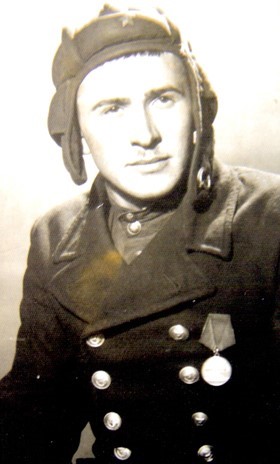Mikhail Shister was born in 1925 in Priluki, in northern Ukraine. His father Semion, who worked for the GPU (the predecessor of the KGB), abandoned the family. Mikhail was able to finish only four grades of school, then began working at a shoe factory in Chernigov, also in northern Ukraine. After the Soviet annexation of Eastern Poland in 1939, Mikhail's father appeared suddenly and took Mikhail to Lutsk, in the Soviet annexed areas, where he had been appointed a public prosecutor. There Mikhail learned of the German attack on the Soviet Union in its first hours when the Germans bombed Lutsk, which was located close to the Soviet-German demarcation line. As a senior Soviet administrator, the father succeeded in getting his son evacuated eastward on the fourth day of the war.
In the fall of 1941 Mikhail, two of his siblings, and their mother arrived to Kazakhstan, in Soviet Central Asia. Mikhail went to work at a phosphate mine. His mother died a short time after their arrival. Once more their father came to the rescue of his children, taking them to Uzbekistan. In January 1943, Shister was drafted into the Red Army. In an interview given by Shister in 2008, in response to the question "With what attitude did you join the army?" Shister said:
"I had a great desire to serve. I was already well aware of what the Germans were doing to the Jews and I realized that I had to avenge my people."
From iremember.ru
After three months training in a camp in central Russia, in May 1943 the young anti-tank gunner Shister was about to be sent to the front. At the last moment, an officer arrived and proposed that whoever wanted to go to a school for tank crews. "My close friends Volodya Tekushin and Sasha Turmorezov, both Kuban Cossacks, wanted to attend that school – recalled Shister in a 2008 interview. – They asked me: 'Why don't you go?' I replied: 'I am not going there, people would say: another Yid wants to avoid combat'. [They said:] 'Forget it. Do you want to carry a cannon on your back? Afterward, we will fight in a tank instead of trampling the dust with our feet. Come with us!'" So, instead of going straight to the front, Shister went to Saratov, in the Lower Volga area, where the tank school was located, and he became a tankman. In March 1944, he was finally sent to the front, but only in June of that year did he take part in a Red Army offensive, in Poland. His baptism by fire was in Volhynia (in West Ukraine), where he crossed the Bug River in his tank and entered Poland. There he was awarded his first medal, For Courage.
From Poland Shister's tank corps turned south toward Slovakia. Near the Dukla Pass (in the Carpathians) he was severely wounded and was awarded his second medal. Later Shister fought in Germany, where he took part in the forcing of the Oder River. Shister ended the war near Prague. Several times he narrowly escaped being burned to death in his tank. He recalled that he had succeeded in destroying six enemy tanks.
After the war, Shister settled in Chernigov, where he worked as a mechanic dealing with the municipal heating system.
Antisemitism on the frontlines
1.
At the end of the war, after Shister had put three enemy tanks out of action, he was recommended for a military order but did not receive it. In his 2008 interview he explained why:
"When, after I had destroyed three tanks, toward the end of the war I was recommended to receive a military order and my citation for the award came for the signature of the chief of staff of the brigade. After reading aloud my name and the "fifth item" [the indication of ethnicity, i.e., that Shister was Jewish] he said: "This one will get along without it." The zampolit (deputy commander for political matters), who stood beside of the head of the staff, did not object [to this decision]. It seems to me that, as a zampolit, he was supposed to utter the Party slogan, something like 'all are equal in our country' ..."[1]
2.
"[In 1944,] reinforcements arrived [at the regiment], all of us were born in 1926. We were sitting in a wide circle around the fire and one sergeant, from the new ones [reinforcements], said to me with a smirk: "All of your kin occupied Tashkent [in Central Asia, i.e. far from the frontlines], and you are the only fool who is sticking at the front." Before I could think of what to reply, my friend the Kuban Cossack Volodya Tekushin pulled this sergeant aside and said 'Let's have a talk'. A moment later, the sergeant returned and apologized to me. I said to him "It's all right, my fellow countryman. Forget it, but you'd better hold your tongue, because – take a look – [the Jews] Shakhnovich and Troianker are sitting opposite you, and if you say such a thing to them, they will make short shrift of you." Then Vania Ivanov, our Tatar [by ethnicity], who was given his Russian first and last names in an orphanage, comes up and says to the sergeant: 'If you are dare utter some a hooey like that once more ...' ."







